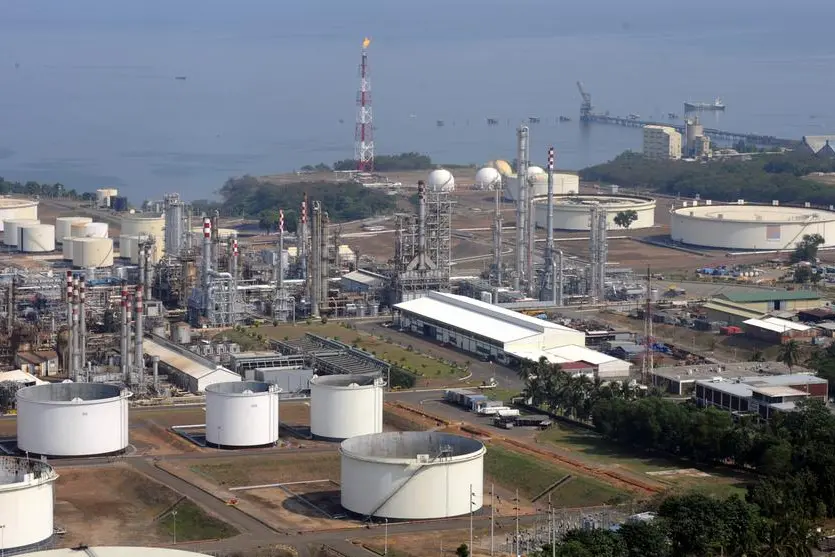PHOTO
Policy think tank Infrawatch PH urged the government to take immediate action to address challenges brought about by rising oil prices.
Infrawatch PH called on all concerned government agencies, particularly the Department of Energy (DOE), Department of Budget and Management (DBM) and Department of Transportation, and even Congress to 'heighten and continuously monitor the mitigation measures to protect the public from further financial strain.'
'We urge President Ferdinand Marcos Jr. to issue an executive order to fast-track the suspension of value-added tax (VAT) on oil products. Every moment counts. An executive order can provide immediate relief to millions of Filipinos affected by the unabated price hikes,' Infrawatch PH convenor Terry Ridon said.
'We can't afford to be complacent. We need concrete solutions, and we need them now,' he said.
Infrawatch PH also called on the DBM to expedite the release of the fuel subsidy for the transport sector.
DBM earlier this month announced that it had approved the release of P3 billion for the fuel subsidy program, targeting 1.36 million beneficiaries in the transport sector affected by the fuel price surge.
'We see no reason the fuel subsidies won't reach our PUV (public utility vehicle) drivers,' Ridon said. 'Time is of the essence. While this is a momentary, stop-gap measure, the subsidy remains essential to mitigate the impact of these relentless price hikes.'
While it lauded Speaker Ferdinand Martin Romualdez's dialogue with oil executives on Monday, the think tank said the situation calls for more immediate measures.
'While we commend Speaker Romualdez for leading the talks in finding a win-win solution to the oil price hikes, we do not have the luxury of time. Urgent action unencumbered by the legislative mill should be pursued,' Ridon said.
Infrawatch PH likewise expressed support to a suggestion to open the Oil Deregulation Law - Republic 8479 - for congressional review.
'This 25-year-old law has long outlived its usefulness. Initially enacted in 1998, the law has led to frequent and unregulated price adjustments, affecting everything from public transportation to the cost of basic commodities. This law has given oil companies free rein over pricing, and the public pays the price,' he said.
Oil companies yesterday raised prices by P2 per liter for both gasoline and kerosene, and a heftier P2.50 for diesel.
This extended the increases in diesel and kerosene prices for an 11th consecutive week, and gasoline for the 10th straight.
The 11 straight weeks of upward adjustments in the prices of diesel and kerosene have so far amounted to P17.30 per liter and P15.95 per liter, respectively.
The 10 consecutive weeks of increases in gasoline prices, on the other hand, have amounted to P11.85 per liter.
'Today's oil price hike serves as a dire warning for a nation already facing economic challenges. We are at a critical juncture. The government must act swiftly to avert a full-blown crisis,' Ridon said.
DOE-Oil Industry Management Bureau director Rino Abad in a television interview yesterday explained that the factors leading to the oil price hikes started in November last year, when OPEC+ decided to cut oil production by around three million barrels per day.
He said this was followed by further production cuts of 1.66 million barrels per day and 1.3 million barrels per day announced this year.
'What's worse, recently on their ministerial meeting in September, they said that the reduction will be extended until end of the year. So immediately after that, OPEC oil market report, International Energy Agency report came out wherein it is projected that by end of the year, there is a deficiency in daily production of no less than 500,000 barrels per day,' Abad said.
As such, Abad said it is expected that oil prices would remain high due to supply tightness toward end of the year.
'Definitely, we will not return to the March and May level wherein Dubai crude is at $77 per barrel. Now it's at $91. So definitely we do not expect to go back to the $70 level,' Abad said.
The DOE official, however, noted that while pump prices may continue to increase for the remainder of the year, its intensity would not be as strong as what has been seen in recent weeks.
Copyright © 2022 PhilSTAR Daily, Inc Provided by SyndiGate Media Inc. (Syndigate.info).





















